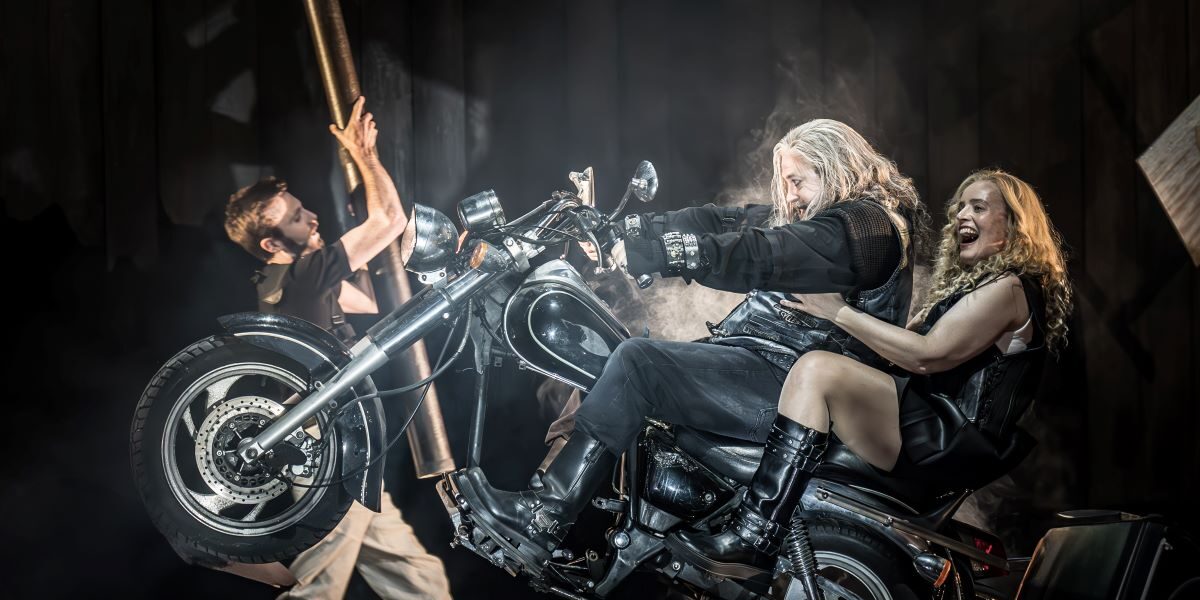It is truly surprising that Mazeppa (1884) is not better known. It is work of Tchaikovsky’s maturity and full of his trademark operatic gifts: an abundance of memorable melody, deft orchestration, memorable characters, and grand public scenes where dilemmas are played out in dramatic choruses. Moreover, its historic setting within the origins of the rivalry between Russia and Ukraine could hardly be more topical. Grange Park Opera have once again done us a real service in placing it before the public.
Mazeppa was a hetman or provincial governor angling for Ukrainian independence between the Russians and Swedes, essentially a wily and ruthless leader of a militia army, who is used to getting his own way. Despite the age-gap he determines to marry his own god-daughter, Mariya, much to the horror of her parents, but to her delight, as she has secretly loved him for a long time. The vengeance of her parents misfires, and Mazeppa executes her father, which begins the unravelling of Mariya’s identity before Mazeppa’s defeat by the Russians scatters everyone’s hopes and plans.
David Pountney’s production is full of ideas, most of which work well. Mazeppa is reinvented as a free-wheeling Hell’s Angel, and while there are echoes of traditional Russian folk culture too, we also are in a world of high-tech brutality, drug-taking and casual abuse. While there is a a great deal of darkness (not least in a torture scene that arrestingly precedes the dinner interval), there is also a lot of comedy and and dance energy. This kind of mash-up seems to get the balance right in giving us distance from what we are seeing while also encouraging reflection on contemporary resonances.
There is some really fine singing on show here. David Stout’s various arias in the title role are spread comfortably across the evening. He delivers them with technical assurance, clear diction and a compelling mixture of charm and menace that makes sense of the character. In some ways the moments of self-doubt and introspection, as so often with this composer, linger longest in the memory. Opposite him, Rachel Nicholls, as Mariya, has, perhaps, the most demanding role across the cast. She successfully moves from ingenue, to besotted and then jealous lover, before losing her mind under the burden of the choices she has made. Each aspect is credibly presented, despite some unsteadyness at the top of the register.
All the supporting roles are well taken and the chorus too, in various incarnations, is superbly vigorous and engaged. As Mariya’s rejected suitor, Andrei, John Findon sings very elegantly, despite not being a naturally rugged Cossack. As the aggrieved parents, Luciano Batanic and Sara Fulgoni make the most of the resplendently strident music of denunciation Tchaikovsky gives them, and Andreas Jankowitsch is a suitably sinister sidekick and torturer.
The orchestra has a lot to do over the length of the evening, with several important scene-setting preludes and interludes to present. We are fortunate that the orchestra of English National Opera is here on this occasion to deliver its usual strongly characterised playing, though the conducting of Mark Shanahan seemed at points somewhat disengaged. The set designs by Francis O’Connor make ingenious use of the two wooden towers seen in other productions this season to take us from domestic interiors, both benign and barbarous, to military encampments and battlefields. The use of coffins and zombie soldiers was a particularly eerie and prescient representation of battle slaughter that was apt for the music and for our own times.
All in all, this was a totally absorbing opera making a strong case for more frequent performances of a memorable score and of a story that we need to know as much for ourselves as for historical information.
Music: Pyotr Ilyich Tchaikovsky
Libretto: Viktor Burenin after Pushkin
Director: David Pountney
Conductor: Mark Shanahan
Cast includes: Luciano Batanic, John Findon, Sara Fulgoni, Andreas Jankowitsch, Rachel Nicholls, David Stout
Until 6 July 2025
4 hrs 35 mins with dining interval
Photo Credit: Marc Brenner

